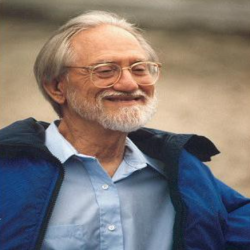
Ken Keyes Jr.
| Date of Birth | : | 19 Jan, 1921 |
| Date of Death | : | 20 Dec, 1995 |
| Place of Birth | : | United States |
| Profession | : | Author |
| Nationality | : | American |
Ken Keyes Jr. was an American personal growth author and lecturer, and the creator of the Living Love method, a self-help system. Keyes wrote fifteen books on personal growth and social consciousness issues, representing about four million copies distributed overall.
Early life
Keyes was born an only child to an affluent family in Atlanta. Throughout their lives, he was close to his father and especially to his mother, despite her eventual abuse of alcohol. He suffered from chronic bronchitis and croup in his infant years, and in 1925 his family moved to Miami Beach, Florida, in hopes of his benefiting from its sunny climate. His father, Kenneth Keyes Sr., became successful in real estate development there and active in the conservative evangelical wing of the Presbyterian Church. Keyes was not very athletic as a child, but excelled in academics and developed hobbies, such as photography. When he was in high school, his father bought him a small boat, which began his lifelong interest in sailing.
Keyes attributed the seeds of the personal growth system he would later develop to an experience he had with a stern English teacher in ninth grade. Despite her reputation as a strict teacher and hard grader, he made an effort to be personally caring toward her, which led to her giving him a slight break in grading. He took the lesson from this experience to be "that when I express caring and friendliness, they are reflected back to me in life."
Final years
Keyes and Penny eventually were divorced and the Ken Keyes College closed. In 1990, Keyes began studying inner-child healing and the rapid-eye-movement therapy developed by Francine Shapiro. He established the Caring Rapid Healing Center in Coos Bay to do private multi-day counseling workshops in this area, and wrote his final book, Your Road Map to Lifelong Happiness, on these topics.
Keyes married a fourth wife, Lydia, who survived him. He died of kidney failure in 1995. He was also survived by his children, Ken Keyes III and Clara Hardin.
Quotes
To be right, be willing to admit you are wrong.
I have everything I need to enjoy my here and now - unless I am letting my consciousness be dominated by demands and expectations based on the dead past or the imagined future.
It is only your mental habits and your selected memories of how you think things are that keep you from moulding things in your life in a more harmonious way.
You always have enough to be happy. It's the patterns in your head that make you unhappy.
By tuning in to your minute-to-minute stream of consciousness, you discover the addictions that make you worried, anxious, resentful, uptight, afraid, angry, bored, etc. You thus use every uncomfortable emotion as an opportunity for consciousness growth. Even though you may still be feeling emotional and uptight, you begin to get at the roots of your ups and downs - your brief bits of pleasure and your long periods of unhappiness.
I am freeing myself from security, sensation and power addictions that make me try to forcefully control situations in my life and thus destroy my serenity and keeps me from loving myself and others.
Whenever you're unhappy, your emotions are telling you that the people or things around you are not conforming to your vision of the world, or the way you think things should be.
You stop viewing yourself as being "pushed around" by the world when you realize that only you can "push" yourself. To quote Buddha: "Nothing is upsetting you. You get upset because you are upsettable."
I welcome the opportunity (even if painful) that my minute to minute experience offers me to become aware of the addictions I must reprogram to be liberated from my robot-like emotional patterns.
The love and peace of higher consciousness flow from just being - and enjoying it all. Anything you do will not be enough unless you feel fulfilled in just being. Usually we are not happy when we find doing whatever it is that we think we have to do. Doing creates expectations that your world and the people around you may or may not fit. The things we do disappear in time. We must learn to appreciate just being alive in the nowness of whatever situation we are in.
